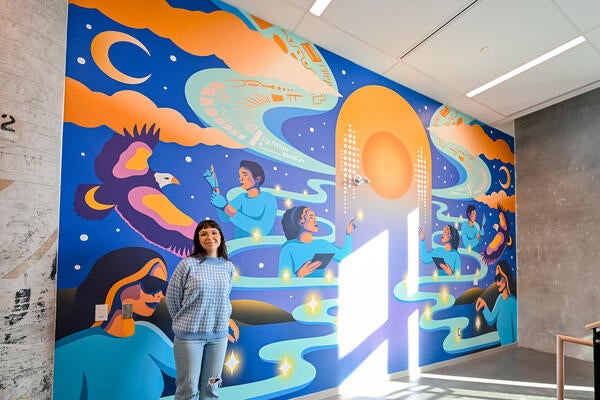
From entrepreneur to mentor
Learning from others to build success for the future

Learning from others to build success for the future
By Etta Di Leo University RelationsEric Migicovsky (BASc ’09) had no idea what to expect when he started his own company. Although he created the Pebble — one of the world’s first smartwatchs — Migicovsky had only just completed his engineering degree at Waterloo.
“I had no expectations,” Migicovsky said. “I was fresh out of school and just happy to build stuff. I have great memories of running the assembly line to build the watches in the garage behind our house.”
Migicovsky, who will participate in an upcoming Waterloo Innovation Summit, was building the InPulse — the first iteration of a smart watch that would evolve into the Pebble. The idea for a watch that allowed the wearer to read their email and receive messages first came about while Migicovsky was working on a co-op term at the Netherlands' Delft industrial school in 2008.
“I was in my final year of engineering and had worked in a bunch of different co-op jobs. I enjoyed them, and it was great to try so many different jobs, but it wasn’t what I wanted. I think of all students who don’t get to experience co-op during school. They graduate and maybe find a job right away where they make a lot of money, but they have no idea if it’s right for them.”
Although Migicovsky was attracted to the idea of building his own business, it wasn’t until his final year when he came upon an idea he felt had potential. In 2012, his company, The Pebble Corporation, garnered a great deal of attention for their hugely successful kickstarter campaign that asked backers to help fund the company and raised more than $10 million.
“I like to say we were the five-year overnight success. We were naïve, and it took longer than expected, but it helped us in many ways. We didn’t lose hope or get down. We didn’t think about how hard it was, we just did it.”
Migicovsky got started at Velocity before getting accepted to Silicon Valley’s Y Combinator accelerator, which provides support, early funding and mentorship to tech entrepreneurs. The move allowed the company to accelerate at a faster pace and set larger goals. Migicovsky is among 150 Y Combinator founders who attended the University of Waterloo — those 150 founders make up nearly 100 startups.
“We were connected to people who had experience building consumer electronics. They gave us advice on manufacturing and design. Starting a company is very difficult. You want to have the cheat codes to success. The biggest advantages came from talking to people who have done it before. It’s not that they tell you exactly what to do, but you learn from their experience so that you can make new and more imaginative mistakes.”
In 2016, when Migicovsky sold Pebble to FitBit, he was invited to become a partner in Y Combinator and made the transition from entrepreneur to mentor.
“At Y Combinator, I’ve had the pleasure of personally working with probably 500-800 founders. My mentorship and advice comes less from my time at Pebble and more based on working with other founders. It’s less about my own experience and more about the aggregated experience of hundreds of entrepreneurs.”
Migicovsky believes that anyone with a sense of adventure and a novel idea can create a successful startup if they can access the right resources. He’s impressed with how many startups now call Waterloo Region home. The sheer number of companies combined with support programs like Velocity, which offers early startup support and funding, has created a supportive and active environment. He hopes more people take the leap to entrepreneurship and discover entrepreneurship programs like Velocity’s Concept and Y Combinator’s Startup School, a free online program to help founders with every detail of starting their own business.
“Startup School is based on the 2,500 companies we’ve funded at Y Combinator. It aligns well with our mission, which is to encourage people to start a company. The more startups, the better.”
While startups may not have all the answers on how to navigate the difficult economic times we can expect ahead, he does see the advantages for established businesses to take on traits from startups.
“The essence of startups is that they set short-term goals and move quickly. Companies can learn to adopt that level of speed and clarity of focus. It doesn’t work across the board, but it certainly fits in tech. One of the secret advantages of startups is their naiveté. They don’t have the weight of experience holding them down. Nothing is keeping them from dreaming big about the future.”
Migicovsky is looking towards the future as he gets set to participate in the Waterloo Innovation Summit on August 19. He is looking forward to participating with other tech leaders and connecting with founders. He also hopes participants walk away motivated to create something new.
“Part of going to events like the Waterloo Innovation Summit is to feel inspired. It’s great to hear and celebrate remarkable stories. But I also want people to realize that they are capable of doing it too. I want them to walk away and not just think ‘Wow, that’s crazy.’ I want to them to realize ‘I can do this too!’”

Read more
Many Hearts, One Mind by Indigenous artist Alanah Jewell celebrates the act of creation shared by the Land and innovators in our community

Read more
Here are the people and events behind some of this year’s most compelling Waterloo stories

Read more
It Started in Waterloo: An Astronaut's Journey into the Universe of Innovation, narrated by Chris Hadfield, highlights the University of Waterloo’s role in igniting innovation within the region and beyond.
The University of Waterloo acknowledges that much of our work takes place on the traditional territory of the Neutral, Anishinaabeg, and Haudenosaunee peoples. Our main campus is situated on the Haldimand Tract, the land granted to the Six Nations that includes six miles on each side of the Grand River. Our active work toward reconciliation takes place across our campuses through research, learning, teaching, and community building, and is co-ordinated within the Office of Indigenous Relations.